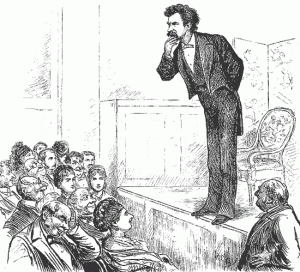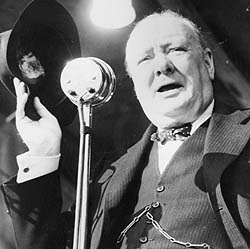Good Speaker, Great Speaker: The Three Key Components to a Persuasive Speech
Lesson 2 – How to Organize an Effective Presentation
For Lesson 1 go to Good Speaker, Good Listener, For Lesson 3 go to Taking Public Speaking to the Next Level

“I do not give lectures or a little charity. When I give, I give myself.”
– Walt Whitman
You’ve got a few PowerPoint presentations under your belt. The jitters of stage fright are a thing of the past. You even actually kind of enjoy them a little. You may even have this public speaking thing down pat.
But there is always more to learn, Young Jedi. You want to go from being a good speaker to rocking the room. Maybe not Martin Luther King rocking, but close. It’s time for the next level.
Novices can get by putting together a great plan with nice slides. More experienced speakers have a few custom tricks up their sleeve to make a good impression. But the Masters know that there are three things they need to be to bring an audience their side. Credible, Relevant and Memorable. Sound easy? Its not. That’s why we call them Masters:
Credible: Get them to listen.
The first moments are the only ones you get for free. Everything after that must be earned from your listeners. No matter what the topic of your presentation, your credibility is always in question. So why should the audience believe a word you say?

Churchill giving his final address in the 1945 election campaign at Walthamstow Stadium, East London
Credibility is not always established simply by boasting your credentials or having them introduced. Confidence, appearance and language say more about you than the letters after your name. Most of all, your audience needs to get to know you before they trust you.
No less than a quarter of your presentation should be the story about you and your relation to the subject matter. Tell them how you know what you know. State your sources and how you came by them. And always present this process as a first-person narrative.
That’s the difference between an oral presentation and a memo: An oral presentation is about you. Human beings have a hard-wired weakness for human stories. It is how we understand the world. Use this to your advantage.
Relevant: Get them to care.
Once your audience feels like they know you and trust you, they will listen. Once you have them under your spell, you owe them to make what you are saying matter. Conversely, your audience owes you nothing. Their ear is charity enough. Think about who they are and what they value. How does your topic relate to their lives? Describe it in a way that they can appreciate.
A good communicator comes to a presentation prepared and organized. A great communicator can change the plan at a moment’s notice and wing it. The notes you have prepared are not a script. They serve simply as a means for you to forge a logical understanding of the material for yourself.
Think of Aesop’s Fables. Everyone knows the story of the ant and the grasshopper, but the story has never been told the same way twice. Anyone could tell that story without memorizing a single word. The fable itself is nothing more than a template. Versions of the story are adjusted to the audience and the speaker. Yet each version hits the same series of vital checkpoints that are the content of the message.
Your presentation is such a fable. Told as such, your audience will in turn be able to adapt the story to their own narrative. Your story then takes on a life of its own, and lives to be repeated by your listener.
Memorable: Get them to remember.
The mind is a fickle device. It’s no small task to make a strong impression and deliver a great speech, but if it doesn’t stick, it didn’t happen. Unlike the written word, your live presentation flows through time like a river. It’s in one ear and out the other. With so much information bombarding us everyday, how can your humble speech stay in your audience’s mind once they leave the room?
Politicians, newscasters, advertisers and even religions have long ago figured this out. They make cunning use of nifty catch phrases, emotional connection and, most of all, repetition. By creating talking points to clearly punctuate each important item, you give your listener an easy way of later finding it in their cluttered mind.
Educational Psychologists Iran-Nejad, McKeachie, and Berliner found in a study that the more a message is rooted in a personal and cultural context the more it will be remembered. Religious ceremonies often attach a familiar tactile sensation to a ritual. Politicians like to attach a sense of identity and community to their message. News media condense their message into easily digestible rhetoric. Advertisers use repetition to get their point across. It sounds evil, but it works.
Feel free to exploit these techniques in your humble speech. Your audience is no stranger to this process and well-trained to accept dogma. Get your listeners to participate in your presentation. Find how they can identify culturally with your topic. Then punctuate it with a catchy phrase that rolls off the tongue nicely. And don’t forget to repeat, repeat, repeat, repeat,….repeat, …repeat. Repeat.
Ready for more on public speaking check out http://wp.me/ptcfd-fq
Here are some examples of some extremely persuasive presentations taken from Hollywood. Look closely at how the speakers establish themselves as credible, relevant and memorable.
Example 1: George C. Scott as General Patton in Patton
http://www.liveleak.com/view?i=5cb_1178900597
Credible: The General establishes his credibility before even saying a word. His slick uniform, decorations and ivory-handled revolver speak for themselves.
Relevant: He speaks to the audience in their own language. What interests these young soldiers? Glory. Victory. The bragging of an avuncular ball-breaker good ol’ boy who loves to win. He may be a son-of-a-gun, but he’s our son-of-a-gun…
Memorable: He appeals to their identity as Americans, with cowboy movie sound-bytes and colloquial poop jokes. You just can’t wait to use that line in a conversation.
Example 2: Danny Devito as Larry the Liquidator in Other People’s Money.
Credible: His introduction and moniker would have been enough, but look how smug and confident he is with a hostile audience. Better listen to what he says.
Relevant: It wasn’t hard for him to figure out his audience’s weakness: Money. Relate everything to money, and they are putty in your hand.
Memorable: The second most frequently used word in his speech is “Money”. The most frequent word is “Dead”. Talk about subliminal messages…
Example 3:Micheal Douglas as Gordon Gekko in Wall Street
Credible: Notice how he gives his speech from the floor among the shareholders and not the suits on the stage whom he maligns.
Relevant: Like Larry the Liquidator, he’s no-nonsense. Gekko knows what it’s all about. Money. They’re not here for the entertainment.
Memorable: Every stock broker in America once chanted his famous words in a drunken frat rage. “Greed is Good”, really? Say it enough times and it becomes true.
Example 4: Alec Baldwin as The Guy From Mitch and Murray in Glengarry Glenross
Credibility: “See this watch? Its worth more than your car.”
Relevance: He hits them where it hurts. Its make money or walk.
Memorable: “Put the coffee down. That coffee`s for closers.”
Example 5: Kevil Allocca: Why Videos Go Viral
Credibility: “I watch YouTube videos for a living”
Relevance: Great examples of well-known YouTube sensations.
Memorable: 3 points, easy to remember. Tastemakers, Participating Communities, Unexpectedness.
For More on Public Speaking, Stage Fright, and PowerPoint Presentations check out: Good Speaker, Good Listener











What an excellent post! I am currently working on a presentation and this had so much i hadn’t thought of! I loved the examples too. Thanks.
Let us know how the presentation goes.
Great post. You’ve captured some pillars of marketing as well. When it comes to public speaking, I think authenticity is the key. Pick a topic that’s important to you; it shows. 🙂
Good point. You’ve got to mean it, your audience can tell. They will only ever be half as excited as you are.
Why are there no examples of women speaking?
Good point. Any suggestions? Check out Part 1 of this article. There are a couple of examples: http://wp.me/ptcfd-6o
wow! Wonderful guidlins.